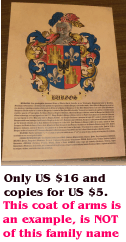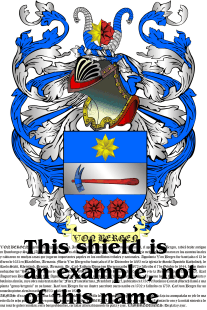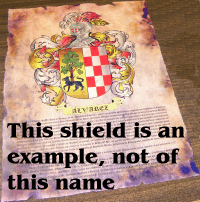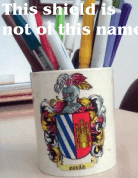
Parchment with the coat of arms, origin and history for the family name Polyander. Very cheap.

Coat of arms for Polyander and the history and origin for the family name Polyander in JPG or Vectorial files as Corel-Draw, AI, WMF, etc.
The coats of arms and family crests with meaning for the family name Polyander are collected in the Armorial General by Johan Baptiste Rietstap, this work is the greatest work of heraldry ever written and drawn, with more than 100,000 family names from around the world (English, Scotish, Welsh, Spanish, French, Italians, Poles, Portuguese, Dutch, etc.), among which is the name Polyander, arranged alphabetically, and DRAWN, including a heraldic handbook with drawings, a complete glossary of terms, a supplement and an appendix. Complete description the coat of arms Polyander, and origin for the family name Polyander, nobiliary titles of the family name Polyander and of the concession dates. The text where the family name Polyander appears is in the second edition, expanded and revised from 1884-1887.
The family crest and coat of arms of Polyander appears in Rietstap Armorial General that is a multi-volume work on the coats-of-arms of the world; it is both monumental and without equal, and is the most exhaustive undertaking of its kind. The Armorial General is the most authoritative work on the coats-of-arms in the world. The descriptions of the arms cover those of more than 100,000 families, included Polyander alphabetically arranged and accurately described.In addition to a full description of the arms for Polyander, most entries identify the nationality of the arms bearer, titles of Polyander, and the date his title was conferred. The basic text was established with the publication of the second edition, corrected and enlarged, of 1884-1887. This most important reference work contains the shields of thousands of Coats of Arms covering the whole world, arranged alphabetically under surnames, as Polyander.One of the most distinctive qualities of heraldry is the use of a limited palette of colours and patterns, usually referred to as tinctures. These are divided into three categories, known as metals, colours, and furs.
Next we are going to see the meanings of three tinctures:
1) SABLE: Black color that symbolizes Prudence, Sadness, Rigor, Honesty and Obedience.
2) PURPLE: Justice, Wit, Truth, Greatness, Wisdom and Love; those who wear this color are obliged to defend the Prince defending ecclesiastical people.
3) OR (Gold): Nobility, Magnanimity, Wealth, Power, Light, Constancy and Wisdom.
Next lets look at the characteristics of some figures that we can find in heraldry and crests:
* EMPIRE: The Head of the Empire, belonging to Italian heraldry, represents a political alliance with the Ghibelline party (derived from the Hohenstaufen, Lords of Waibling) who were loyal to the Emperor.
* WATER: The Water is a symbol of Enlightened Wisdom, of Virtuous Mood, and can also symbolize domain extension.
* LANCE: The Lance represents Strength with Prudence.
* IVY: The Ivy symbolizes Love Bond and also Triumph.
* HEART: The Heart is a symbol of Vigilant Vassal. In its fiery color, it demonstrates Warmth of mind and loving expression of Affection.
* borduraNOusar: La Bordura simboliza Protección, Favor y Recompensa; asimismo la cota que vestían los caballeros y que al salir de la pelea, ostentándola manchada de sangre enemiga, eran premiados con el añadido de la bordura de escudo, como insignia de Valor.
* PANELA: The Panelas are figures similar to a heart and are a symbol of Vigilant Vassal.
* WOLVES: The Wolves are a symbol of a Constant Heart that suffers the calamities of war and siege with generous spirit; but when the time comes to fight in the open field, he fiercely fights, without giving his enemy a barracks.
* The family name Polyander appears in the list of last names of Heraldry & Crests so its complete history, crest and coat of arms or heraldic shields can be known on his website: http://www.heraldrycrests.com/
Heraldry for family name Polyander as well as its history is at your disposal here: Heraldry, history, origin, crest and coat of arms of the family name Polyander
Related Words: Polyander family crest | Origin of the name Polyander | Genealogy of the family Polyander | Heraldry of the name Polyander | Coat of arms of Polyander | Genealogy of the Polyander | Origin of the Polyander | Meaning of the name Polyander.

Images of some books referred, with information of the family name Polyander:

All the information about the surnames that are collected in this web site are based on verified bibliography.
Origin of family name, history and coat of arms/crests

